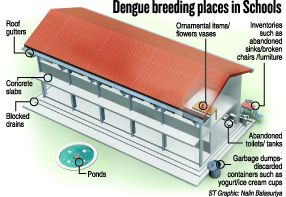News
Dengue danger will loom large in years to come: ADB report
Dengue will continue to claim hundreds of lives in Sri Lanka with about 400 deaths annually and over 60,000 cases by 2030, 700 deaths annually by 2050 and up to 353,000 cases and over 2,000 fatalities by 2090: This is the alarming forecast made in the Asian Development Bank’s (ADB) latest report, “Assessing the Costs of Climate Change and Adaptation in South Asia”.
The report said vector- borne diseases like dengue have been on the rise in recent years and the increase in population, rising temperatures and resultant change in weather patterns could contribute to the rise in the number of cases and fatalities. Because of climate change, increase in rainfall intensity could cause water logging that creates conditions for mosquito breeding, it pointed out.
“Vulnerability of the health sector is amplified by other factors, including dumping of solid waste that contaminates surface water and groundwater and also creates vector breeding conditions; poorly managed urban drainage also enhances the spread of disease,” the report warned.
According to the Epidemiology Unit here, last year, 85 people died of dengue while 32,000 contracted the fever countrywide. This year 28,336  dengue cases have been reported with Colombo, Gampaha, Kurunegala and Ratnapura districts recording the most number of cases. June and July recorded the highest number of cases. By June 50 deaths had been reported for this year.
dengue cases have been reported with Colombo, Gampaha, Kurunegala and Ratnapura districts recording the most number of cases. June and July recorded the highest number of cases. By June 50 deaths had been reported for this year.
Health officials have warned of a possible increase in dengue cases in the coming months with scattered rains reported islandwide.
With schools being seen as vulnerable, the Health Ministry organised an island-wide dengue prevention campaign on August 29 and 30 targeting schools in view of schools reopening in September. The campaign was carried out with the support of the military, school authorities, Public Health Inspectors (PHIs) and parents.
The Health Ministry’s dengue Control Unit’s senior consultant, Dr. Nayana de Alwis explaining why schools were given priority said, “school premises harbour a lot of mosquito breeding spots. After a month’s vacation if the premises are not cleaned up students are at risk of contracting dengue fever. Schools should conduct cleaning programmes during the first week or two.” She said schools in the Western Province would be targeted mainly because of the high student population and the rains from the Southwest monsoon affecting the province.
The campaign in schools will inspect and clean possible breeding places such as roof gutters, abandoned toilets, overhead tanks, ponds and garbage dumps with discarded containers such as yogurt/ice cream cups, abandoned sinks, broken chairs and discarded furniture and concrete slabs.
In addition, a mosquito control week will begin on September 10. “We have allocated each day to various categories such as schools, religious places and universities. Each of these institutions will be cleaned up on their respective days with the help of the local community, volunteers and the military. Houses will be inspected during the weekends. These activities will be done under the supervision of PHIs,” Dr. de Alwis said.
She warned the Moratuwa, Dehiwala, Kolonnawa, Maharagama MoH areas would continue to be vulnerable to the disease due to poor solid waste management.
Another health official said, if the disease followed the recent pattern where once in two years there was a peak, 2014 would be a risk year.
In 2010, 246 dengue deaths were reported, while in 2011 it was 185 and in 2012, 225. Last year 85 deaths were recorded.
The Colombo Municipal Council’s Chief Medical Officer Dr. Ruwan Wijayamuni said the slight increase in the number of dengue cases this month could be due to the scattered rains islandwide.

